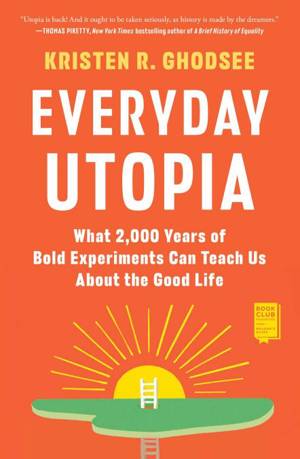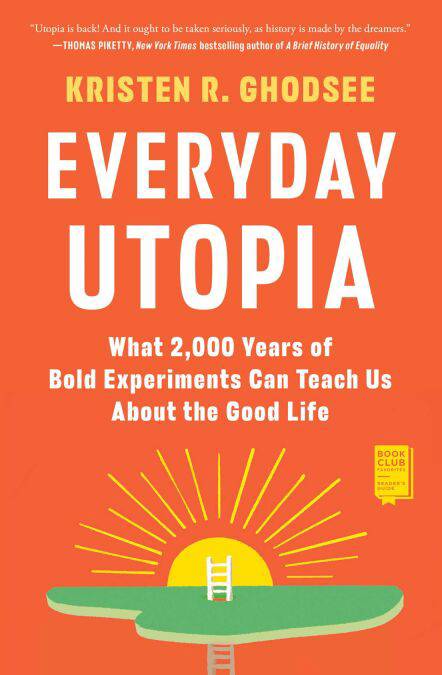
Bedankt voor het vertrouwen het afgelopen jaar! Om jou te bedanken bieden we GRATIS verzending (in België) aan op alles gedurende de hele maand januari.
- Afhalen na 1 uur in een winkel met voorraad
- In januari gratis thuislevering in België
- Ruim aanbod met 7 miljoen producten
Bedankt voor het vertrouwen het afgelopen jaar! Om jou te bedanken bieden we GRATIS verzending (in België) aan op alles gedurende de hele maand januari.
- Afhalen na 1 uur in een winkel met voorraad
- In januari gratis thuislevering in België
- Ruim aanbod met 7 miljoen producten
Zoeken
Everyday Utopia E-BOOK
What 2,000 Years of Wild Experiments Can Teach Us About the Good Life
Kristen R. Ghodsee
E-book | Engels
€ 16,76
+ 16 punten
Omschrijving
A “fascinating” (The Wall Street Journal), “spirited and inspiring” (Jacobin) tour through the ages in search of the thinkers and communities that have dared to reimagine how we might better live our daily lives.
In the 6th century BCE, the Greek philosopher Pythagoras—a man remembered today more for his theorem about right-angled triangles than for his progressive politics—founded a commune in a seaside village in what’s now southern Italy. The men and women there shared their property, lived as equals, and dedicated themselves to the study of mathematics and the mysteries of the universe.
Ever since, humans have been dreaming up better ways to organize how we live together, pool our resources, raise our children, and determine who’s part of our families. Some of these experiments burned brightly for only a brief while, but others carry on today: from the Danish cohousing communities that share chores and deepen neighborly bonds, to matriarchal Colombian ecovillages where residents grow their own food; and from Connecticut, where new laws make it easier for extra “alloparents” to help raise children not their own, to China where planned microdistricts ensure everything a busy household might need is nearby.
One of those startlingly rare books that upends what you think is possible, Everyday Utopia provides a “powerful reminder that dreaming of better worlds is not just some fantastical project, but also a political one” (Rebecca Traister, New York Times bestselling author of Good and Mad). This “must-read” (Thomas Piketty, New York Times bestselling author of A Brief History of Equality) offers a radically hopeful vision for how to build more contented and connected societies, alongside a practical guide to what we all can do in the meantime to live the good life each and every day.
In the 6th century BCE, the Greek philosopher Pythagoras—a man remembered today more for his theorem about right-angled triangles than for his progressive politics—founded a commune in a seaside village in what’s now southern Italy. The men and women there shared their property, lived as equals, and dedicated themselves to the study of mathematics and the mysteries of the universe.
Ever since, humans have been dreaming up better ways to organize how we live together, pool our resources, raise our children, and determine who’s part of our families. Some of these experiments burned brightly for only a brief while, but others carry on today: from the Danish cohousing communities that share chores and deepen neighborly bonds, to matriarchal Colombian ecovillages where residents grow their own food; and from Connecticut, where new laws make it easier for extra “alloparents” to help raise children not their own, to China where planned microdistricts ensure everything a busy household might need is nearby.
One of those startlingly rare books that upends what you think is possible, Everyday Utopia provides a “powerful reminder that dreaming of better worlds is not just some fantastical project, but also a political one” (Rebecca Traister, New York Times bestselling author of Good and Mad). This “must-read” (Thomas Piketty, New York Times bestselling author of A Brief History of Equality) offers a radically hopeful vision for how to build more contented and connected societies, alongside a practical guide to what we all can do in the meantime to live the good life each and every day.
Specificaties
Betrokkenen
- Auteur(s):
- Uitgeverij:
Inhoud
- Aantal bladzijden:
- 352
- Taal:
- Engels
Eigenschappen
- Productcode (EAN):
- 9781982190231
- Verschijningsdatum:
- 15/05/2023
- Uitvoering:
- E-book
- Beveiligd met:
- Adobe DRM
- Formaat:
- ePub

Alleen bij Standaard Boekhandel
+ 16 punten op je klantenkaart van Standaard Boekhandel
Beoordelingen
We publiceren alleen reviews die voldoen aan de voorwaarden voor reviews. Bekijk onze voorwaarden voor reviews.









